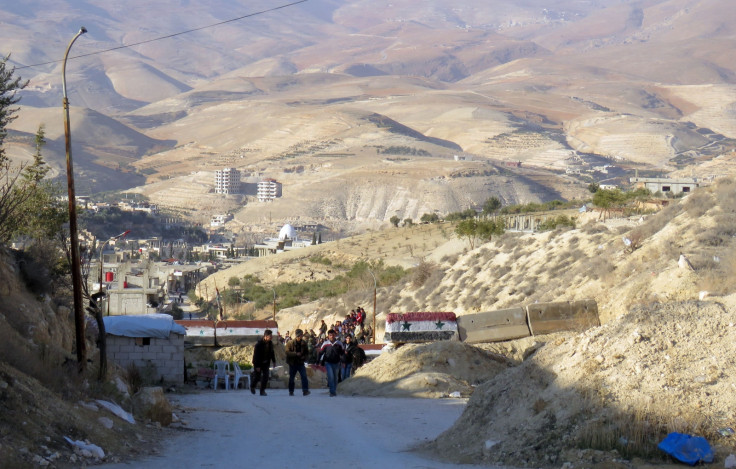Isis may be losing in Iraq – but it is fighting back in Syria
Bashar al-Assad's strategy has enabled Islamic State to regain ground.

As the battle for Mosul looks like it will lead to a clear defeat for Islamic State (Isis/Daesh), the group is shifting its focus back to Syria. IS recently launched two major offensives in the country, one targeting and later capturing Palmyra in December last year, and the other this week, isolating a key military airport in the eastern city of Deir ez-Zor. It is no coincidence that such attacks are being launched at a time when the group's presence in Iraq, its other stronghold, is being threatened.
After weeks of fighting inside Mosul, the eastern side of the city seems poised to fall to Iraqi government forces. IS will have to withdraw from the eastern bank of the Tigris river, which divides the city into two almost equal parts, with the western part of the city remaining thus far untouched by Iraqi forces. Yet, as it was slowing down a much larger fighting force in eastern Mosul the group bought enough time to reconsider its strategic position in the region.
IS has always been an opportunistic actor. It knows how to take advantage of temporary weaknesses in its rival's defensive lines, while pragmatically dodging lost battles with more powerful opponents. In a sense this exact strategy that the group has so successfully used during its rise to power, is now being applied as it fights for its survival.
While mounting a staunch resistance in Mosul against the Iraqi government, and in northern Syria against Turkish-backed forces, IS carried out pinpoint offensives aimed at Assad's weaker army. In Palmyra, the group took advantage of the then raging battle in Aleppo to carry out a "Blitzkrieg" offensive the type of which hadn't been seen since the group took the Iraqi city of Ramadi in 2015.
Similarly in Deir ez-Zor, the group is targeting an isolated pocket of regime soldiers, whose only supply line, a fragile "aerial bridge", has been under threat since the group took the mountains surrounding the airport a few months ago.
But targeting Assad's forces in areas where it is not propped up by foreign, and often Iranian-trained forces, may not simply be a military decision. Faced with three main offensives against it, including a Kurdish-led attack west of the group's de facto capital of Raqqa, IS's decision to launch its own offensives against Assad may be the reflection of its broader strategy rather than a simple tactical calculation.
Assad's strategy favours the regime as much as it suits IS itself.
Again, just as the group initially used the Syrian civil war to build a rear base for its invasion of Iraq, it is now making a comeback in the political and military struggle between pro-and-anti-regime forces, hoping to be seen by Syrians as their best chance to oust Assad.
IS' offensives in Syria indeed come at a time when the Syrian rebels are faced with unprecedented military and political challenges. With the defeat in Aleppo the prospect of a military victory over Assad's forces is farther than ever, and supporters of the Syrian revolution are – explicitly or implicitly – searching for another arrangement that may not entail Assad's departure.
Turkey has clearly moved away from being one of the opposition's most prominent supporters, to a more "realistic" position that focuses on preserving Ankara's political gravitas in the region while preventing the creation of a Kurdish entity in northern Syria. Meanwhile the Gulf states, with the possible exception of Qatar, are also scrambling to redefine a losing strategy that was based on the assumption that military successes would eventually force Assad out.
As the Syrian opposition fails to deliver its promises, IS counts on the frustration of those not ready to accept a reconciliation with a murderous regime to boost its faltering ranks damaged by the collapse of its positions along the Syrian border, the loss of several cities in Iraq's Anbar province by government forces, and months of heavy fighting across Iraq and Syria.
Such a possibility may seem distant, as Syrians certainly know what living under the group's rule means, yet Assad's strategy of knocking down the moderate opposition to eventually be seen as the only alternative in Syria against "terrorists", favours the regime as much as it suits IS itself. In that not-so-distant future the "Caliphate" in its current form may be lost in Iraq where IS fighters will certainly go back to "the desert" -as the group's now defunct spokesperson stated in a notorious speech- but the Syrian theatre would remain, by contrast, promising.
Michael Horowitz is director of intelligence at Prime Source, a Middle-East-based geopolitical consultancy producing updates and analysis on the Syrian and Iraqi conflicts.
© Copyright IBTimes 2025. All rights reserved.






















